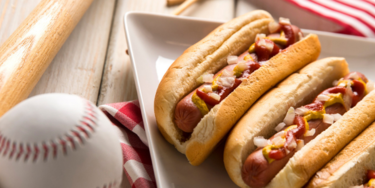
Not Using Stainless Steel? It’s Time to Ketchup
Summer is here. You know what that means, Baseball—and you can’t forget the hot dogs! During Hot Dog Season, Memorial Day to Labor Day, Americans typically consume 7 billion hot dogs, which is about 800 hot dogs consumed each second!
Have you ever wondered how companies make this delectable cookout favorite? The National Hot Dog and Sausage Council has all the details on how they make them in the Big Leagues.

- Specially selected trimmings are cut and ground into small pieces and put into the mixer.
- A high-speed, stainless steel chopper blends meat, spices and curing ingredients into an emulsion or batter.
- The emulsion is pumped and fed into a stuffer. Shirred strands of cellulose casings are mechanically positioned on the stuffing horn. As the emulsion flows through the horn into the casing, the filled strands are linked into hot dogs of the exact size needed. The strand is then put on the smokehouse conveyor system.
- In smokehouses, under controlled temperature and humidity, the hot dog is fully cooked, and hardwood smoked for texture, color, and a delicious flavor.
- After passing through the smoke and cook cycle, and being showered in cool water, the hot dog goes into the peeler. Here the protective, air and smoke-permeable cellulose casing “skin” is stripped away, and individual links are conveyed to the packaging line.
- Finally, the hotdogs are conveyed to scales then fed into the vacuum packaging equipment. Here, individual packages are wrapped and vacuum sealed in plastic film to protect the freshness and flavor of the hot dog.
- Once packaged and boxed, hot dogs are moved to storage coolers and loaded on refrigerated trucks for delivery.
While you’re consuming these delicious dogs, you probably never think about the process of making them and keeping the industrial gearboxes that churn them out, cleaned and sanitized--unless you’re in the industry.
With the Food and Beverage industry booming, cleanliness is at the top of every food processing plant’s mind. Food processing plants are mandated by the U.S. Department of Agriculture and the Food and Drug Administration to adhere to specific protocols and best practices that help ensure the safety of our food supply and protect companies from the shattering costs of product recalls.
Already in 2019, there’s been more than 40 recalls reported by the USDA for food containing bacteria such as Listeria, Salmonella or E. coli or other hazardous extras that no one wants to digest accidentally
In 2018, there were nearly 400 food product recalls. Companies sometimes recalled products more than once. About 70 U.S. food products were recalled due to possible Listeria contamination in 2018. Most of these products were cheese products, meats, and pet food. Salmonella was suspected and found in eggs, ready-to-eat deli salads and wraps, while E. coli was mostly found in raw ground beef and romaine lettuce.
A single product can be recalled for more than one reason. For example, if there are two different types of microbial contamination in the same product.
These recalls are a significant threat to any business in the food and beverage industry. Not only does a recall disrupt operations, but it can also hurt consumer confidence in the brand, which can have a long term effect on sales. On average, a food recall can cost a company $10 million in direct costs, according to a study by the Food Marketing Institute and the Grocery Manufacturers Association (GMA.)
A survey by Harris Interactive found that 15% of consumers would never buy that product again, and 21% of people affected by a recall would not buy any product from the same manufacturer.
That’s where we come in with our stainless-steel gearmotor—Fortress. She’s fierce, fancy and maintenance-free. This AISI 304 stainless-steel beauty provides increased corrosion resistance and is suitable to use with a variety of chemicals. Each Fortress gearmotor features a compact, modular housing. We fill them with FDA approved synthetic grease, and seal it for life. She also boasts up to 93% gear efficiency with an IP69K rating--perfect for harsh, high-pressure wash-down environments. The icing (or ketchup) on top? Fortress’ smooth contour design reduces the number of build-up bacteria in hard-to-reach areas.
From mixing to chopping, processing, and packing, you can find industrial gearmotors throughout many meat processing plants. Don’t allow a food recall to throw your business a curveball--let Fortress protect what matters.
Learn more about Fortress and configure your product here.
About Sumitomo Drive Technologies
Sumitomo Drive Technologies has been trusted for over 130 years to provide quality products and innovative solutions to help our customers solve their complex challenges. This rich history has made us a leading manufacturer of power transmission and control products such as gearmotors and industrial gearboxes for a wide variety of applications for leading brands around the globe. For more information about our products and services, please contact us.
Written by Karlaa Williams
Digital Marketing Analyst